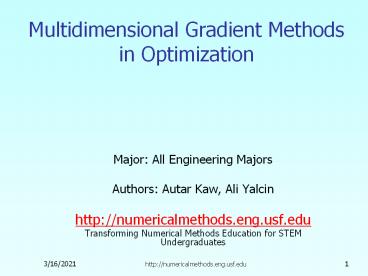Multidimensional Gradient Methods in Optimization - PowerPoint PPT Presentation
Title:
Multidimensional Gradient Methods in Optimization
Description:
Title: Euler Method for Solving Ordinary Differential Equations Subject: Euler Method Author: Autar Kaw, Charlie Barker Keywords: Power Point Euler Method – PowerPoint PPT presentation
Number of Views:145
Avg rating:3.0/5.0
Title: Multidimensional Gradient Methods in Optimization
1
Multidimensional Gradient Methods in Optimization
- Major All Engineering Majors
- Authors Autar Kaw, Ali Yalcin
- http//numericalmethods.eng.usf.edu
- Transforming Numerical Methods Education for STEM
Undergraduates
2
Steepest Ascent/Descent Method
http//numericalmethods.eng.usf.edu
3
Multidimensional Gradient Methods -Overview
- Use information from the derivatives of the
optimization function to guide the search - Finds solutions quicker compared with direct
search methods - A good initial estimate of the solution is
required - The objective function needs to be differentiable
4
Gradients
- The gradient is a vector operator denoted by ?
(referred to as del) - When applied to a function , it represents the
functions directional derivatives - The gradient is the special case where the
direction of the gradient is the direction of
most or the steepest ascent/descent - The gradient is calculated by
5
Gradients-Example
- Calculate the gradient to determine the direction
of the steepest slope at point (2, 1) for the
function - Solution To calculate the gradient we would
need to calculate - which are used to determine the gradient at point
(2,1) as
6
Hessians
- The Hessian matrix or just the Hessian is the
Jacobian matrix of second-order partial
derivatives of a function. - The determinant of the Hessian matrix is also
referred to as the Hessian. - For a two dimensional function the Hessian matrix
is simply
7
Hessians cont.
- The determinant of the Hessian matrix denoted by
can have three cases - If and then has a local
minimum. - If and then has a
local maximum. - If then has a saddle point.
8
Hessians-Example
- Calculate the hessian matrix at point (2, 1) for
the function - Solution To calculate the Hessian matrix the
partial derivatives must be evaluated as - resulting in the Hessian matrix
9
Steepest Ascent/Descent Method
- Starts from an initial point and looks for a
local optimal solution along a gradient. - The gradient at the initial solution is
calculated. - A new solution is found at the local optimum
along the gradient - The subsequent iterations involve using the local
optima along the new gradient as the initial
point.
10
Example
- Determine the minimum of the function
- Use the point (2,1) as the initial estimate of
the optimal solution.
11
Solution
Iteration 1 To calculate the gradient the
partial derivatives must be evaluated as
Now the function can be expressed along
the direction of gradient as
12
Solution Cont.
Iteration 1 continued This is a simple function
and it is easy to determine by
taking the first derivative and solving for its
roots. This means that traveling a step size of
along the gradient reaches a minimum
value for the function in this direction. These
values are substituted back to calculate a new
value for x and y as follows
Note that
13
Solution Cont.
Iteration 2 The new initial point is
.We calculate the gradient at this point as
14
Solution Cont.
Iteration 3 The new initial point is .We
calculate the gradient at this point as
This indicates that the current location is a
local optimum along this gradient and no
improvement can be gained by moving in any
direction. The minimum of the function is at
point (-1,0).
15
Additional Resources
- For all resources on this topic such as digital
audiovisual lectures, primers, textbook chapters,
multiple-choice tests, worksheets in MATLAB,
MATHEMATICA, MathCad and MAPLE, blogs, related
physical problems, please visit - http//nm.mathforcollege.com/topics/opt_multidime
nsional_gradient.html
16
- THE END
- http//numericalmethods.eng.usf.edu































